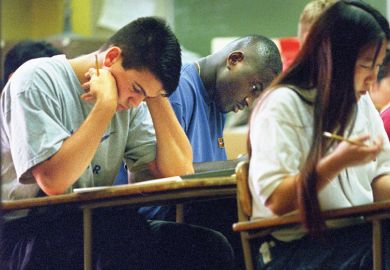After a year of reflection and strategising following the George Floyd killing, Canada’s leading universities have jointly committed to a far-reaching outcomes-based pathway towards racial equity across their operations.
The process was ratified in a joint assembly of the leaders of nearly 50 Canadian colleges and universities, including most of the nation’s most prominent. It promises hard deadlines for improvement, with publicly available progress reports, in specific areas that include faculty hiring, student scholarships and mentoring, and curricula focused on black history and perspectives.
“This was a really deliberate effort to say we're going to have specific actions,” said the chair of the nationwide negotiating process, Wisdom Tettey, the vice-president and principal of the University of Toronto at Scarborough.
Canada has earned a reputation in recent years for taking seriously the need to recognise and rectify the long-standing abuses of its indigenous population, and its historical treatment of its black population often has been compared favourably to that of the US.
Yet the May 2020 killing of Mr Floyd by a Minneapolis police officer helped focus attention in Canada on the fact that the country’s black citizens still face significantly poorer opportunities in education, while suffering higher unemployment, lower pay and greater incarceration rates.
That led in October to the start of a process shepherded by Professor Tettey that produced the Scarborough Charter. It doesn’t set any specific goals or timelines for any individual institutions, but it makes clear that each must write them based on their own circumstances, and provide the public with clear data on their progress towards meeting those goals.
That was too much for many institutions, as those presidents signing the final agreements represent less than a quarter of Canada’s 200-plus degree-granting institutions.
The signatories at the end include Jacques Frémont, the vice-chancellor of the University of Ottawa, who admitted that his institution was still writing its plan but understood it will mean heavy public scrutiny of what has been promised and what gets accomplished.
“People will be able to judge us if the needle is moving or not,” Professor Frémont told Times Higher Education.
Some institutions came to the process expecting “to issue feel-good statements, and then not necessarily deliver on what it is that we profess to believe”, Professor Tettey said. But he said “there was a commitment right from the beginning, when we had the national dialogue in October of last year, to say, we are not going to pander to these feel-good sentiments – we’re going to come up with something concrete.”
At the University of Toronto, he said, the goals include building a professoriate that within seven years matches the racial composition of the student body. Others include completing a curriculum overhaul to ensure that readings and teachings reflect black experiences and hiring enough black counsellors to provide students with culturally appropriate mental health support.
At the University of British Columbia, equity in faculty and curriculum also form primary goals, said Ananya Mukherjee Reed, provost of the UBC campus at Okanagan. The nationwide charter helps with that, Professor Mukherjee Reed said, because people pushing for equity at individual institutions can often feel isolated and will now have a better sense of being part of a collective push with recognised norms.
Without that, she said, “You feel like you are kind of alone trying to push a boulder up, and it’s coming down.”
The nationwide togetherness also helps create common standards in practices and data, Professor Frémont said. That’s already been a research topic pursued by members of the U15 Group, which represents Canada’s top research universities, he said.
All but three of the U15 institutions have signed the Scarborough Charter. Two of those three holdouts – the University of Montreal and Laval University – are French-speaking institutions in Quebec, where political leaders have broadly resisted acknowledging the problem of systemic anti-black racism.
The Scarborough Charter signing also comes at a difficult moment for the University of Ottawa, where a professor’s use of an anti-black racial slur last year led to a commission headed by Michel Bastarache, a retired Canadian Supreme Court justice. That commission recently concluded its work with a report suggesting ways to balance academic freedom with respect for equity and diversity that still left criticisms on both sides.
Professor Frémont said he saw no reason why there needs to be a conflict between free speech and concern for minority populations. “For me, there is no contradiction, absolutely no contradiction,” between the two, he said. “But we have to change the culture so that there is no tension, and that’s what the report is inviting us to do.”




